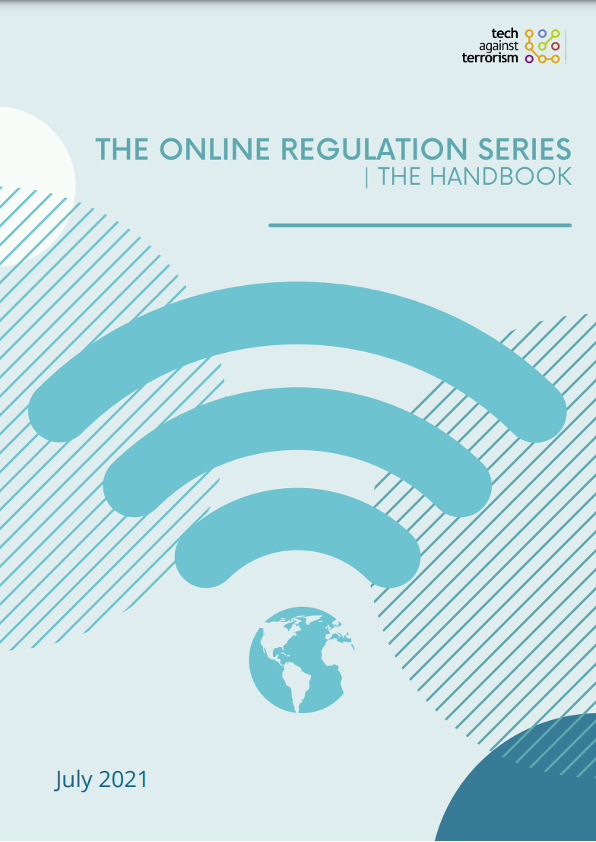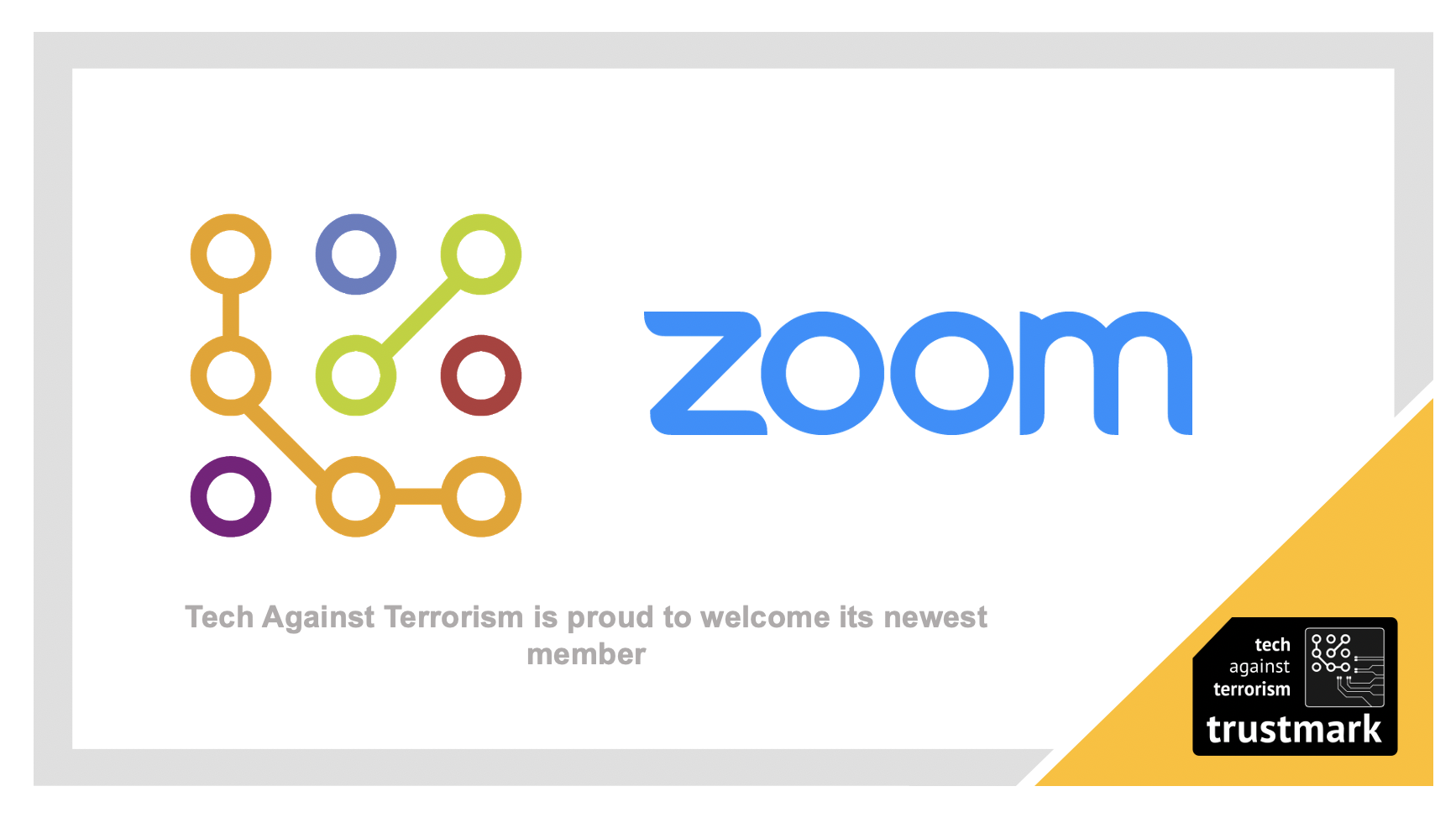March 2021 Update
Webinars
- Thank you to everyone who tuned in for the first 2021 webinars of the TAT & GIFCT E-learning Webinar Series. This month we hosted webinars on “The Nexus Between Violent Extremism and Conspiracy Theory Networks Online” as well as one on “Technical approaches to countering terrorist use of the internet: URL sharing and collaborative tech sector efforts”.
- If you were unable to attend either of the webinars and would like to access a recording, please get in touch with us at contact@techagainstterrorism.org.
“The Nexus Between Violent Extremism and Conspiracy Theory Networks Online”
Agenda
- Erin Saltman, Director of programming, GIFCT
- Emily Thompson, Associate Director, Simon Wiesenthal Center,
- Sam Jackson, Assistant Professor, at the University at Albany and author of Oath Keepers: Patriotism and the Edge of Violence in a Right-Wing Antigovernment Group
- Marc-André Argentino, PhD Candidate at Concordia University, Research Fellow at the ICSR
- Patrick James, Facebook, Dangerous Organizations Policy
- Moderator: Fabienne Tarrant, Research Analyst, Tech Against Terrorism
“Technical approaches to countering terrorist use of the internet: URL sharing and collaborative tech sector efforts”
Agenda
- Adam Hadley, Director, Tech Against Terrorism
- Anne Craanen, Research Analyst, Tech Against Terrorism
- Audrey Alexander, Researcher and Instructor, West Point's Combating Terrorism Center
- Lisa McInerney, Cyber Crime Policy Manager, Twitter
- Detective Jim Scarrott, Metropolitan Police Service
- Moderator: Tom Thorley, Director of Technology, GIFCT
The Terrorist Content Analytics Platform
- We hosted our March sessions of the TCAP office hours. This is one of the steps we are taking to ensure that the platform is developed in a transparent manner. If you would like to access a recording of these sessions, you can reach out to us at contact@techagainstterrorism.org.
Stakeholder Processes
- In March, Tech Against Terrorism proudly announced that Pinterest and JustPaste.it have joined our Membership Programme. You can read our full statement on this announcement here.
 |
Media coverage
- This month, Tech Against Terrorism’s research on far-right videogame recreations of terrorist attacks was mentioned in an article by CityAM.
What's up next?
- Stay tuned for more information on our upcoming webinar "Countering terrorist use of emerging technologies: Assessing the risks of terrorist use of E2EE and related mitigation strategies”, which will take place on 29 April, 5pm BST.
- Our monthly TCAP newsletter will be released next week, shedding light on the development of the platform, key events, and TCAP statistics for the month of March.
Tech Against Terrorism Reader's Digest – 2 April
Our weekly review of articles on terrorist and violent extremist use of the internet, counterterrorism, digital rights, and tech policy.
Top stories
- Wired has reported that the Home Office is actively exploring legal and technical mechanisms to compel Facebook and WhatsApp to break end-to-end encrypted messaging.
Open Right Group has published a response to this, which you can read here.
- The Global Network Initiative (GNI) has released a new report examining the social impacts of network disruptions in sub-Saharan Africa and advocacy strategies in response.
- Moonshot CVE has published a report detailing their “efforts to understand how Canadians engage with violent far-right, Islamic State (IS), and Al-Qaeda inspired content online”.
- This week, a UK Met Police officer has been convicted of being a member of National Action, a UK-based neo-Nazi group designated as a terrorist organisation in the country. This marks the first time that a police officer is found guilty of far-right inspired terrorist offences.
- Pakistan’s media regulator has reinstated access to TikTok after a court last month banned it for ‘vulgar’ content.
- Nick Clegg, Vice President of Global Affairs at Facebook, has published an article in which he discusses the debate on algorithms in social media.
On this topic, we have recently published a position paper on content personalisation and terrorist use of the internet, in which we argue that whilst algorithmic recommendation systems warrant scrutiny policy-makers should prioritise other actions – including improving designation and supporting smaller platforms – in order to tackle terrorism online. Read our paper here.
Tech Policy
- Turkey’s Social Media Law: A Cautionary Tale: Ayla Jean Yackley discusses Turkey’s internet legislation - known as the Social Media Bill - which requires platforms with more than a million daily users to appoint a local representative by next month to enforce court orders to remove content. Platforms will also have to store user data within the country, which critics stress may expand government surveillance of citizens. Yackley highlights how civil society has voiced concerns about the new rules, which impose heavy fines, ad bans, and tighten bandwidth if social media companies fail to meet the April deadline, which could make them complicit in undermining civil liberties. (Yackley, Politico, 29.03.2021)
To read more about online regulation in Turkey, as well as the implications of its new Social Media Bill for tech companies, see our blog post on it from the Online Regulation Series.
- Terrorism and Other Dangerous Online Content: Exporting the First Amendment? In this article, Michael Posner and Ryan Goodman argue that the United States needs to adopt a pragmatic approach globally rather than asserting that the first amendment is a necessary model for the world. The article explains that the Trump administration did not join the Christchurch call to action following the terrorist attack in Christchurch in 2019 – in which democratic governments joined with major social media companies as a response – as the administration “vaguely” referred to First Amendment concerns to explain its absence. The argument for the US to adopt a more pragmatic approach globally comes soon before the Christchurch Call to Action's anniversary on May 15, as well as the approaching Summit of Democracy. According to Posner and Goodman, this makes now a “high time to reconsider the US posture”. (Posner and Goodman, Just Security, 26.03.2021)
- This week we’re listening to the latest Right Rising episode on Memes and Chan Culture, in which host Augusta Dell’Omo is joined by Blythe Crawford and Florence Keen to discuss Chan culture and the particular media, and memes, created by Chan users.
- We are also listening to the Techdirt podcast in which Jillian York discusses the challenges and pitfalls of internet content moderation and its impact on free expression around the world.
| For any questions or media requests, please get in touch via: contact@techagainstterrorism.org |
- News (240)
- Counterterrorism (54)
- Analysis (52)
- Terrorism (39)
- Online Regulation (38)
- Violent Extremist (36)
- Regulation (33)
- Tech Responses (33)
- Europe (31)
- Government Regulation (27)
- Academia (25)
- GIFCT (22)
- UK (22)
- Press Release (21)
- Reports (21)
- US (20)
- USA (19)
- Guides (17)
- Law (16)
- UN (15)
- Asia (11)
- ISIS (11)
- Workshop (11)
- Presentation (10)
- MENA (9)
- Fintech (6)
- Threat Intelligence (5)
- Webinar (5)
- Propaganda (3)
- Region (3)
- Submissions (3)
- Generative AI (1)
- Op-ed (1)

